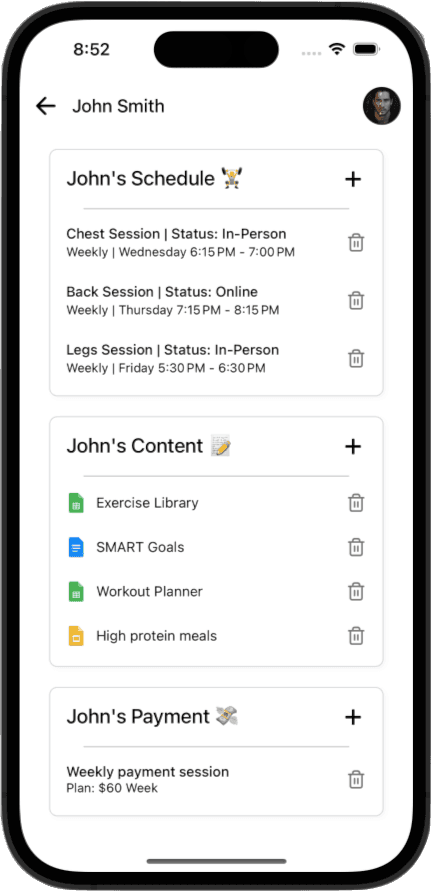Is personal training a dying career?
Anthony Papoutsis
Aug 19, 2024
Personal training is a career that has seen many changes over the years especially in more recent times. With the rise of new technologies and shifting market demands towards online, some people wonder if it’s a dying profession. However, personal training continues to evolve, offering new opportunities and challenges for those in the field.
In this article will explore the evolution of personal training, technological advancements, market demand, alternative career paths, challenges, educational requirements, and the role of personal trainers in healthcare.
Key Takeaways
Personal training is evolving, not dying, with new technologies and market demands shaping its future.
Technological advancements like fitness apps, wearable tech, and virtual reality are transforming the fitness industry.
The demand for personal trainers remains strong, especially as people seek personalized fitness solutions post-pandemic.
Alternative career paths in fitness, such as online coaching and corporate wellness programs, offer new opportunities.
Educational and certification requirements are crucial for personal trainers to stay relevant and effective in their roles.
The Evolution of Personal Training
Historical Perspective
Personal training has changed a lot over the years. It started as a simple concept and has grown into a professional field with a strong focus on education and certification. In the past, personal trainers were often seen as just gym buddies or workout partners. Now, they are recognized as professionals who need proper training and credentials.
Modern-Day Changes
Today, personal training is more than just one-on-one sessions at the gym. Group training sessions are becoming popular because they are affordable, create a community feel and which make it easy for the clients to continue to enjoy sessions. Trainers now use advanced tools and technology to offer personalized workouts and nutritional plans. The rise of fitness apps and online coaching has also changed how trainers interact with clients.
Future Predictions
Looking ahead, personal training will continue to evolve. We can expect more use of artificial intelligence and wearable technology to provide tailored fitness plans. Trainers will also focus more on holistic wellness, including mental health and stress management. The industry will keep growing, but trainers will need to adapt to stay relevant.
Technological Advancements in Fitness
Impact of Fitness Apps
Fitness apps have revolutionized the way we approach workouts. They offer personalized fitness recommendations based on unique differences in muscle mass, metabolism, and ideal diet type. This personalization trend is becoming more important as the personal training industry progresses.
I personally use apps like BULK. It is an all-in-one tool to distribute my content to all my clients. It also allows me to handle my busy schedule and stay organised. Lastly I can seamlessly communicate and accept payments removing all the awkward hassle.

Wearable Technology
Wearable technology, such as fitness trackers and smartwatches, has been a game-changer in personal training. These devices collect data on distance traveled, body movement, and heart rhythm. Personal trainers can use this data to track their clients' progress and adjust their training programs accordingly.
Market Demand for Personal Trainers
Current Market Trends
The market for personal trainers is evolving. Demand for personal trainers at fitness centers has been bolstered by rising disposable income. Semi-private and small group training sessions are becoming more popular because they are affordable and create a community environment. This trend benefits both clients and trainers, as it maximizes training time and cost efficiency.
Post-Pandemic Recovery
The fitness industry faced a significant downturn during the pandemic, but it has shown remarkable resilience. As consumers return to health clubs, some may not have the disposable income for personal training and might opt for group coaching instead. This shift means personal trainers should consider learning how to coach group workouts to create more earning opportunities.
Future Growth Projections
Looking ahead, the demand for personal trainers is expected to grow. The U.S. Bureau of Labor Statistics projects a 10% increase in the number of fitness instructors by 2026. This growth is driven by an increasing awareness of the importance of fitness and health, as well as the expansion of specialized training for different populations, such as seniors and youth.
Alternative Career Paths in Fitness
Corporate Wellness Programs
Today, many big companies want their workers to be healthy. This opens up many chances for personal trainers. You can help with things like how people move at work or even lead fitness sessions during the workday. This can be a great way to earn a steady income.
Online Coaching Opportunities
The Covid-19 pandemic made online training very popular. As an online coach, you can work with one person or many. You can do live sessions or record them for later. The best part is you can work from anywhere with an internet connection.
Specialized Fitness Roles
There are many other jobs for personal trainers. You could become a group exercise instructor, a health and wellness coach, or even a gym manager. The fitness world is big, and there are many ways to use your skills.
Challenges Facing Personal Trainers
Economic Factors
Being a personal trainer is one of the most enjoyable and rewarding careers, but it's also full of challenges. One major challenge is the economic factors. As consumers return to health clubs, they may not have the disposable income for personal training and instead may choose group coaching. This shift means personal trainers need to adapt and learn how to coach group workouts if they are not already doing so.
Client Retention
Another significant challenge is client retention. Our clients may think we are great people, but if they do not love what we are doing, they will not stay. With all the competition and a trainer on every block, we must keep our game face on if we are to succeed. It takes more than just being knowledgeable; it takes someone with an intense internal drive, compassion, intelligence, understanding, and a great personality.
Work-Life Balance
Work-life balance is another hurdle. Initially, we must take clients when we can get them; however, burnout is likely soon to occur if you train from 5:00 am to 9:00 pm every day. Once you are established, it is important to get your schedule to something that is sustainable for the long term. Finding a balance that works for you is crucial to avoid burnout and maintain a long, successful career.
Educational and Certification Requirements
Importance of Accreditation
To become a personal trainer, you'll need to select the right personal trainer certification for your needs. Accreditation is crucial because it ensures that the certification meets industry standards. Without proper accreditation, your certification might not be recognized by employers or clients.
Continuing Education
Staying updated with the latest fitness trends and techniques is essential. Continuing education helps you maintain your certification and stay competitive in the field. Many organizations offer workshops, online courses, and seminars to help trainers keep their skills sharp.
Specialized Certifications
Having a niche can set you apart from other trainers. You might consider certifications in areas like corrective exercises, sports nutrition, or strength and conditioning. These specialized certifications can make you more attractive to a broader range of clients and open up new career opportunities.
The Role of Personal Trainers in Healthcare
Collaboration with Medical Professionals
Personal trainers are increasingly working alongside doctors and other healthcare providers. This collaboration helps create comprehensive wellness plans for clients. By working together, we can address specific clients' post-medical/rehabilitation needs and ensure they receive the best care possible. This partnership is crucial for clients who need specialised attention after medical treatments.
Preventative Health Measures
Personal trainers play a vital role in preventative health. We help clients adopt healthier lifestyles to avoid future health issues. This includes creating exercise routines, offering nutritional advice, and promoting overall wellness. Even for those exceptional personal trainers who do provide the training, our goal is to keep clients healthy and active, reducing the risk of chronic diseases.
Rehabilitation and Recovery
After an injury or surgery, personal trainers are essential for rehabilitation and recovery. We design customized exercise programs that help clients regain strength and mobility. This personalized approach ensures that clients recover safely and effectively. Our expertise in this area can make a significant difference in a client's recovery journey.
Personal training is far from a dying career. While the industry is evolving with the rise of technology and online coaching, the core need for personal trainers remains strong. People will always seek guidance to achieve their fitness goals, and personal trainers provide the expertise and motivation that many individuals need. The future of personal training looks promising, with new opportunities emerging in areas like virtual training and specialized fitness programs. So, if you're passionate about fitness and helping others, personal training can still be a rewarding and stable career choice.


